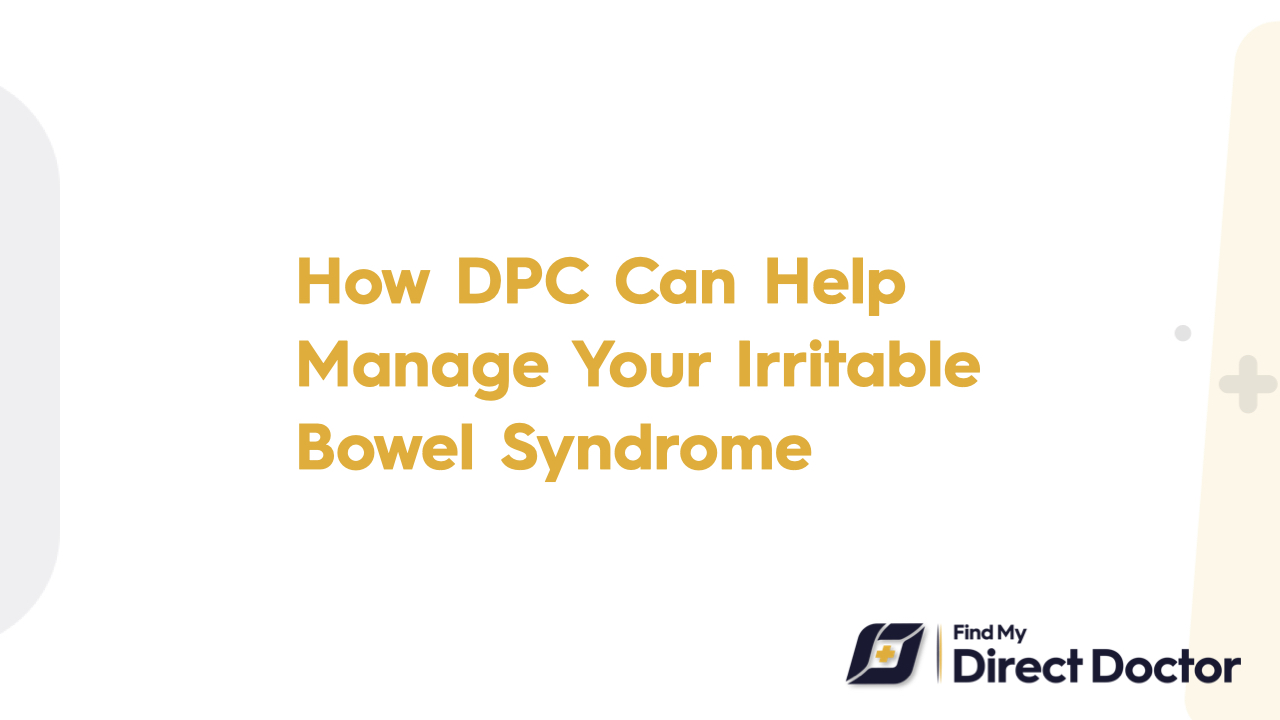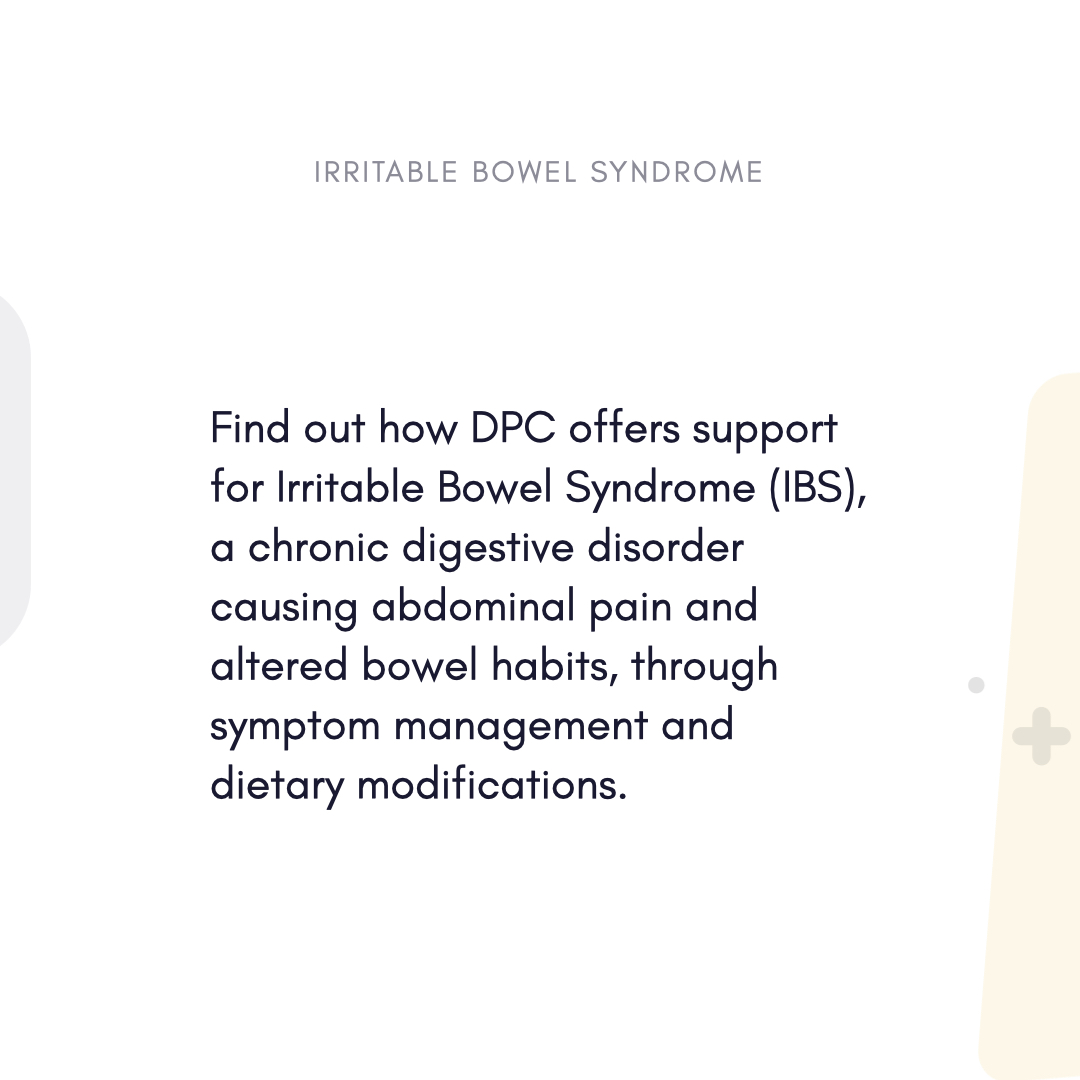Irritable Bowel Syndrome (IBS) and Direct Primary Care (DPC): Your Path to Personalized, Digestive Wellness
Affecting 10–15% of adults worldwide, irritable bowel syndrome (IBS) is a chronic gastrointestinal condition that can cause daily life to be a cycle of stomach pain, bloating, diarrhea, or constipation. Many times providing fragmented treatment, traditional healthcare leaves patients disappointed with trial-and-error approaches. Offering reasonably priced, patient-centered care that finds triggers, customizes solutions, and empowers long-term relief, Direct Primary Care (DPC) changes IBS management.

Gaining Knowledge of IBS
IBS is a functional gut condition driven by intricate interactions between the gut and brain. Principal difficulties include:
- Abdominal pain, gas, IBS-D (diarrhea), constipation (IBS-C), or mixed patterns (IBS-M).
- Food intolerances (e.g., FODMAPs), stress, hormonal changes, or gut dysbiosis all set off reactions.
- Overlapping symptoms with celiac disease, IBD, or SIBO indicate misdiagnosis.
- Mental health links: Anxiety or depression aggravate symptoms, starting a vicious cycle.
Improving quality of life depends on early, customized management.
How DPC Changes IBS Management
Under the membership approach known as Direct Primary Care (DPC), patients pay a monthly fee—usually USD 50–USD 150—for unlimited access to their doctor. This means for IBS sufferers no hurried visits, no surprise bills, and treatment catered to your particular gut-brain interactions.
Individualized Attention Anchored in Expertise
Using American College of Gastroenterology guidelines, DPC doctors provide:
- Full testing: Using discounted labs, rule out inflammatory markers, SIBO, or celiac disease.
- Customized treatment plans:
- Guided low-FODMAP diets, gluten-free trials, or soluble fiber adjustments depending on IBS subtype (IBS-C or IBS-D).
- Pharmacology:
- IBS-C: Lubiprostone or linaclotide to treat constipation.
- Rifaximin—for bacterial overgrowth—or bile acid binders for IBS-D.
- Tricyclic antidepressants or antispasmodics—such as dicyclomine—for pain management.
- Gut-directed hypnosis, cognitive behavioral therapy (CBT), or SSRIs for IBS-related anxiety.
- Probiotics: Advice tailored to strain-specific restoration of gut balance.
- Perfect referrals to dietitians or gastroenterologists under specialist coordination.
Cost-Effective, Transparent Treatment
DPC clinics lower expenses by:
- Drugs sold wholesale: Generic dicyclomine as low as USD 10 a month.
- Discounted labs: SIBO breath tests, stool analyses, or food intolerance panels at cost.
- Proactive treatment helps to prevent ER visits for severe flare-ups.
Ongoing Gut Health Support
Having 24-hour access to your doctor allows you to:
- Change medications or diets during symptom flares.
- Track progress using gut health apps or food/symptom notebooks.
- Treat stress or sleep issues aggravating IBS.
DPC's Customized IBS Management
DPC provides treatment fit for your particular requirements:
- IBS-D vs. IBS-C: Customized laxatives, antidiarrheals, or bile acid binders.
- Food triggers: Elimination diets (gluten, dairy) then progressively reintroduced.
- Yoga, meditation, or gut-directed hypnosis to break the gut-brain cycle.
- Microbiome focus: Customized prebiotics/probiotics to restore gut equilibrium.
Real-Life Success Stories
- Case 1: Emma, 32, battled IBS-D for years. Breath tests let her DPC doctor find SIBO and lactose intolerance. Her diarrhea cleared in eight weeks on a low-FODMAP diet and rifaximin.
- Case 2: David, 45, had IBS-C brought on by stress. His DPC doctor matched CBT sessions with linaclotide to help with bowel regularity and pain reduction.
Frequently Asked Questions: IBS and DPC
- Q: Can DPC request specific tests including SIBO breath tests?
A: Sure! Discounted testing is coordinated by DPC doctors, who also interpret results.
- Q: Is DPC reasonably priced for long-term IBS treatment?
A: Certainly. Memberships grant unlimited visits; drugs are sold at cost.
- Q: Should I require a gastroenterologist?
A: Your DPC doctor shares records for coordinated treatment and handles referrals.
Why DPC Wins for IBS Patients
DPC aligns with gut-brain theory to deliver:
- Accessibility: Same-day dietary changes or sudden flare consultations.
- Continuity: One provider logging your triggers, therapies, and mental health.
- Savings: Affordable labs and medications against specialist costs.
- Long-term relief: Integrating diet, stress, and microbiome health.
Take Charge of Your Gut Health Right Now
IBS need not control your life. Direct Primary Care provides a compassionate, scientifically based method for you to find triggers, lower symptoms, and recover your comfort.






